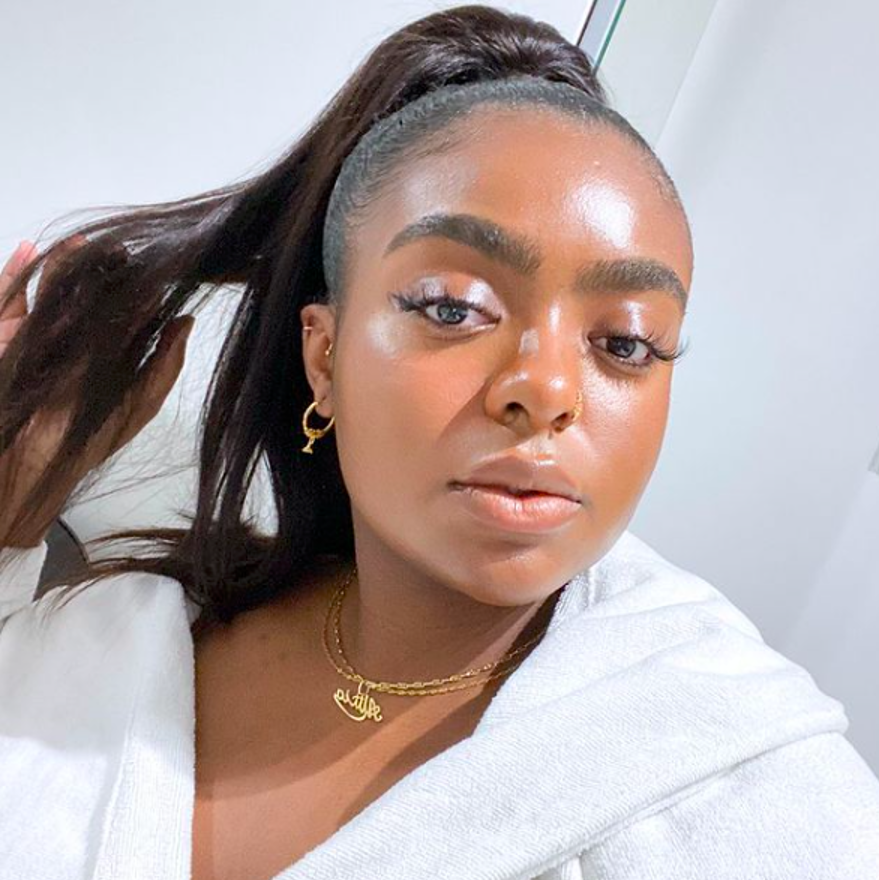Skinfluencer Alicia Lartey looks beyond the surface to tackle racism in the Beauty Industry
Skinfluencer Alicia Lartey looks beyond the surface to tackle racism in the Beauty Industry
Marvel Kalu IG: @marvsskay_ 15 March 21
Alicia Lartey is on a mission to tackle racism in the skincare industry – an industry which has historically ignored the needs of Black women. From dermatological misinformation deterring Black women from procedures such as laser treatments, to the ashy cast of poorly formulated SPFs – mislabeling and scaremongering has resulted in Black women making ill-informed choices regarding their skin care.
Black women are one of the largest consumers of the beauty industry, in the UK they spend on average £137.54 more on beauty products than any other racial group, yet are continually excluded.
Alicia Lartey aka Hydra-Babe is a young Black Biomed undergraduate using her Instagram platform and her scientific background to trial and test the efficacy of skincare products and procedures on deeper skin tones. Alicia reminds us of the importance of diverse representation in the skincare industry.

Photo credit: Alicia Lartey/ Instagram @_alicialartey
“I feel so lucky to be able to represent people that look like me in a space that can be both medical and luxurious. Connecting with people over shared experiences reminds me how far the beauty space has come and is yet to go in terms of representation.”
However, she also points out that Black skincare influencers are still overlooked by major brands for opportunities.
“As a Black skincare influencer there is a lot of pressure to be a professional otherwise you will not have the same opportunities as your white counterparts. A lot of the trends set by Black skincare professionals are often picked up and not credited to the original Black professionals.”
Alicia created her own numbered system for categorising post inflammatory hyperpigmentation (PIH) after being dissatisfied with the information she found online. In doing so she was able to help other Black women identify the level of hyperpigmentation in their skin providing vital knowledge that would change the products they use.
Alicia stated that the motivation behind creating her own unique numbered system to tackle hyperpigmentation was to help universalise and remove any negative language we use to describe the common skin condition.

Image credit: @alicialartey on Twitter

Image credit: @alicialartey on Twitter
Alicia also comments that white dermatologists frequently underestimate or overestimate the severity of pigmentation in deeper skin tones, therefore prolonging a patient’s treatment. An act of negligence notes Alicia, which often results in severe emotional distress and financial loss for Black women.
In a recent survey conducted by OnePole on behalf of LeCerre Skincare, results showed that 63% of women of colour felt that their skincare is ineffective but are afraid to try something new out of fear of the effects it could have on their skin.
“The lack of reference photos of dermatological conditions on Black skin is causing grave medical implications such as prescribing incorrect medication, a form of dismissal by medical professionals and growing distrust within the Black community. Skin care products that label themselves for their brightening and lightening abilities do not translate well for Black consumers with deeply melanated skin.”
The cosmetics industry worldwide released statistics declaring, 39% of the global market accounted for skincare and was estimated to remain the most profitable product category.

But what does this mean for Black consumers of beauty products? By sharing her own skin care journey Alicia has been able to help other Black women battling with hyperpigmentation, but also highlights the inequalities within the skin care industry.
“Dermatologists do not recognise common skin conditions on deeper skin tones as they were not shown those vital images during their training in medical school. The idea that Black women also do not experience pain needs to die too, a lot of medical professionals believe this, and it results in poor care.”
Whilst there is still more work to be done to decolonise the dermatological and skin care industries, Black women continue to educate us on what to buy and avoid. Dija Ayodele is one of many Black women making significant change. As the founder of the Black Skin Directory which helps connect dermatologists of colour, she creates a platform for women of colour to receive the correct help.
Another organisation which is addressing the lack of reference photos of dermatological conditions on deeper skin tones is Brown Skin Matters. This platform shares images, on an open submission basis, to educate people not only on the significance of representation in the medical field, but also other medical professionals who are seeing these conditions for the first time.
I asked Alicia whether she had any advice for future and current Biomed students who feel confused about their options post-graduation.
“Biomed is a really flexible degree and you do not have to work in a lab, you also do not have to do medicine to become successful or feel complete. If you can marry your love of skincare with your scientific background, you’ll be golden.”
Written By: Marvel Kalu – a freelance writer and journalism student at Kingston University who enjoys writing about film, TV and culture. Follow her on Instagram and check out her portfolio
Header Image: Alicia Lartey/Instagram @_alicialartey





